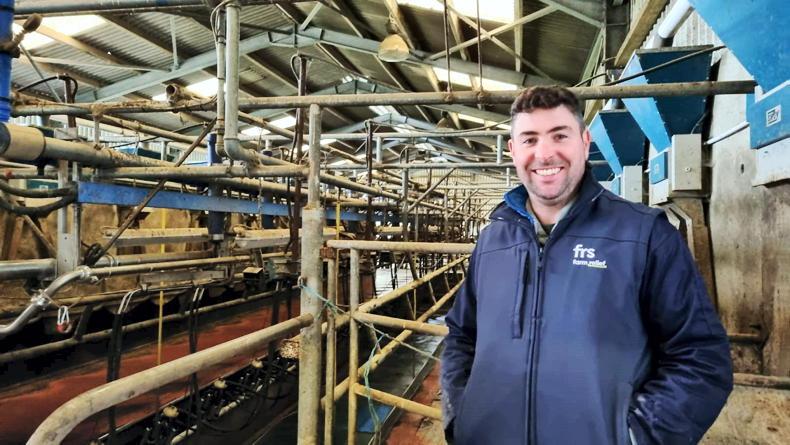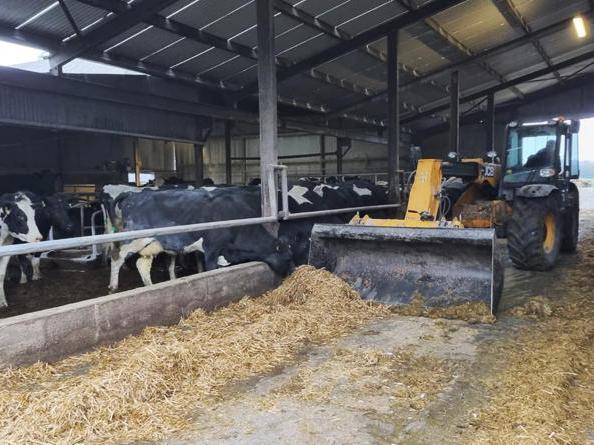Supply is not meeting demand and the FRS Network are calling on farmers to reassess their labour needs, particularly in the dairy sector. The FRS Network has been providing farm operatives since 1980.
“Right across all sectors, at all levels, there is plenty of competition for people,” says John Brosnan of FRS Network.
“People have lots of choice in terms of where they want to work – it’s a good thing obviously for people, but it’s a challenge on the agri side in particular.”
Where the challenge comes into the dairy sector is, often, the work can be seasonally focused around spring calving where an extra pair of hands are needed.
“This time of year, there’s much less work and then in spring you have a seasonal peak,” John explains.

FRS operator John Barry.
“We have had an increase in compact calving in the last 15 years on dairy farms – that window from February 1 to 30 April, depending on the year and how good or bad the weather is, that’s the peak time.”
Living wage
While seasonal work can suit some people – particular those used to work in the gig economy or to students – it doesn’t suit those who are looking to make a living wage.
John says that many farms are falling between the category of needing a minimum of one person or a maximum of two. Again, two are ideal in the peak season but there is not really enough work to keep on both workers year-round.
“It’s much harder to get people to work in general let alone putting them on the on the shelf this time of year to be taken off the shelf in the spring. So, we’re trying to encourage more farmers to commit to taking people on in the offseason.
“At least for some minimum amount of hours or days per week so that we can offer more year-round work for people. That’s what we’re trying to do,” explains John, “it’s not going to solve everything, but it’s a help.”
Lower levels needed
While there are plenty of ag students being turfed out of college after their degree, they typically graduate into more farm manager-type roles. John explains that the roles needing filled are perhaps a level below.
“I think in reality, most of what we are looking for in this country is for somebody who fits in at both the basic dairy farm worker and below the full farm manager role,” he says.
The role requires someone who can take over in the absence of the farm manager or farmer.
“That’s not just somebody who is doing the basic tasks, it’s somebody who is capable of dealing successfully with an animal that is ill, or capable of planning the grass rotation forward for the next few days or weeks – or making sure that antibiotics or other residues don’t enter the milk and therefore the human food chain – it’s a very important job,” he explains.
“They are able to take over the day to day running of the farm in the absence of the farmer.”
Calling on farmers
FRS Network are encouraging farmers to chat with them and see if there are any adjustments that can be made to their employment practices to ensure they can employ operatives on a more full-time basis and also attract the best talent with better working conditions.
Marketing manager of FRS Network Jane Marks has some important points for farmers to consider when trying to attract skilled workers.
She suggests having a plan in place to ready yourself to welcome a new worker on to the farm.
Although recruiting farm staff can be a challenge, she finds having a positive attitude to work and treating workers with respect and courtesy as well as having your plans and preparation in order should make tasks more efficient.
Employing an
operative on
your farm

FRS operator Christina Carroll doing some relief milking.
Some points to consider before employing an operative on your farm are as follows.
Make your facilities and systems as efficient as possible. Part of the planning process should focus on reducing wasted time and avoidable tasks and make the role and facilities as attractive as possible.Consider what facilities you have on the farm that would attract and retain a farm worker – is there a suitable place to wash hands and prepare for meals? Is there a suitable place to eat with the basics such as a small fridge, kettle and microwave? Are there suitable toilet facilities available on the farm? Farm Safety - is all equipment, machinery, gates, pens, and buildings in a safe and working condition? Is the farmyard clean and tidy and free of hazards? Do you have standard operating procedures (SOPs) that you can give to prospective workers to show them how to carry out tasks? Are there farm maps and noticeboards in place on the farm? Do you have instructional photos or videos that you could send by text or WhatsApp to explain how to operate your milking parlour, milk tank, diet feeder etc?If you are a farmer looking to employ a skilled worker, or you are a skilled worker and fancy becoming an FRS Network operative you can find more information here frsfarmreliefservices.ie/careers/
Read more
FBD Young Farmer of the Year 2021 crowned
Galway man appointed Kerry North America president and CEO
Supply is not meeting demand and the FRS Network are calling on farmers to reassess their labour needs, particularly in the dairy sector. The FRS Network has been providing farm operatives since 1980.
“Right across all sectors, at all levels, there is plenty of competition for people,” says John Brosnan of FRS Network.
“People have lots of choice in terms of where they want to work – it’s a good thing obviously for people, but it’s a challenge on the agri side in particular.”
Where the challenge comes into the dairy sector is, often, the work can be seasonally focused around spring calving where an extra pair of hands are needed.
“This time of year, there’s much less work and then in spring you have a seasonal peak,” John explains.

FRS operator John Barry.
“We have had an increase in compact calving in the last 15 years on dairy farms – that window from February 1 to 30 April, depending on the year and how good or bad the weather is, that’s the peak time.”
Living wage
While seasonal work can suit some people – particular those used to work in the gig economy or to students – it doesn’t suit those who are looking to make a living wage.
John says that many farms are falling between the category of needing a minimum of one person or a maximum of two. Again, two are ideal in the peak season but there is not really enough work to keep on both workers year-round.
“It’s much harder to get people to work in general let alone putting them on the on the shelf this time of year to be taken off the shelf in the spring. So, we’re trying to encourage more farmers to commit to taking people on in the offseason.
“At least for some minimum amount of hours or days per week so that we can offer more year-round work for people. That’s what we’re trying to do,” explains John, “it’s not going to solve everything, but it’s a help.”
Lower levels needed
While there are plenty of ag students being turfed out of college after their degree, they typically graduate into more farm manager-type roles. John explains that the roles needing filled are perhaps a level below.
“I think in reality, most of what we are looking for in this country is for somebody who fits in at both the basic dairy farm worker and below the full farm manager role,” he says.
The role requires someone who can take over in the absence of the farm manager or farmer.
“That’s not just somebody who is doing the basic tasks, it’s somebody who is capable of dealing successfully with an animal that is ill, or capable of planning the grass rotation forward for the next few days or weeks – or making sure that antibiotics or other residues don’t enter the milk and therefore the human food chain – it’s a very important job,” he explains.
“They are able to take over the day to day running of the farm in the absence of the farmer.”
Calling on farmers
FRS Network are encouraging farmers to chat with them and see if there are any adjustments that can be made to their employment practices to ensure they can employ operatives on a more full-time basis and also attract the best talent with better working conditions.
Marketing manager of FRS Network Jane Marks has some important points for farmers to consider when trying to attract skilled workers.
She suggests having a plan in place to ready yourself to welcome a new worker on to the farm.
Although recruiting farm staff can be a challenge, she finds having a positive attitude to work and treating workers with respect and courtesy as well as having your plans and preparation in order should make tasks more efficient.
Employing an
operative on
your farm

FRS operator Christina Carroll doing some relief milking.
Some points to consider before employing an operative on your farm are as follows.
Make your facilities and systems as efficient as possible. Part of the planning process should focus on reducing wasted time and avoidable tasks and make the role and facilities as attractive as possible.Consider what facilities you have on the farm that would attract and retain a farm worker – is there a suitable place to wash hands and prepare for meals? Is there a suitable place to eat with the basics such as a small fridge, kettle and microwave? Are there suitable toilet facilities available on the farm? Farm Safety - is all equipment, machinery, gates, pens, and buildings in a safe and working condition? Is the farmyard clean and tidy and free of hazards? Do you have standard operating procedures (SOPs) that you can give to prospective workers to show them how to carry out tasks? Are there farm maps and noticeboards in place on the farm? Do you have instructional photos or videos that you could send by text or WhatsApp to explain how to operate your milking parlour, milk tank, diet feeder etc?If you are a farmer looking to employ a skilled worker, or you are a skilled worker and fancy becoming an FRS Network operative you can find more information here frsfarmreliefservices.ie/careers/
Read more
FBD Young Farmer of the Year 2021 crowned
Galway man appointed Kerry North America president and CEO











SHARING OPTIONS